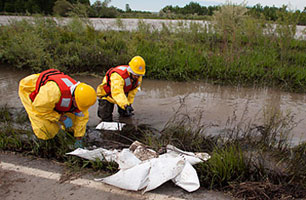 Amid the fireworks, parades, and hot dogs of this past Fourth of July weekend was that sinking feeling of déjà vu when news broke that yet another oil spill was oozing across once-clean waters. This time, it wasn’t the Gulf of Mexico, it was Montana; and it wasn’t BP, it was ExxonMobil. On Friday, 1,000 barrels of crude oil (42,000 gal.) spilled into Yellowstone River after an ExxonMobil pipeline under the riverbed ruptured. The pipeline has been shut down, but not yet repaired.
Amid the fireworks, parades, and hot dogs of this past Fourth of July weekend was that sinking feeling of déjà vu when news broke that yet another oil spill was oozing across once-clean waters. This time, it wasn’t the Gulf of Mexico, it was Montana; and it wasn’t BP, it was ExxonMobil. On Friday, 1,000 barrels of crude oil (42,000 gal.) spilled into Yellowstone River after an ExxonMobil pipeline under the riverbed ruptured. The pipeline has been shut down, but not yet repaired.
ExxonMobil is “making progress” in cleaning up the oil, according to, well ExxonMobil. Company president, Gary Pruessing says that the oil giant is conducting daily reconnaissance tests to see the impact the leak is having in the areas around the riverbanks. At this point, Pruessing says, the cleanup team has yet to find areas affected by the spill beyond 25 miles of where the pipeline ruptured, and the oil found along the shoreline is “in really small patches.”
More from TIME: How the Floods May Restore Louisiana’s Wetlands
“I don’t want to infer in any way that we’ve completed [the tests],” Pruessing said. “If we have citizens with additional information that would conflict that, we encourage them to contact us.”
If ExxonMobil’s tests on air and water quality so far are anything to go by, residents should have no reason to panic. Though citizens of Yellowstone county raised concerns that benzene, a chemical naturally present in crude oil, might be fouling the air in the wake of the spill, air monitoring conducted so far has not found “measurable amounts that would cause problems from a health standpoint,” according to Pruessing. The same goes for water quality: the Environmental Protection Agency has conducted sampling throughout the river but has yet to pick up anything harmful.
“All the monitoring has indicated that we don’t have any air issues…and we have not had any reports about water quality,” Pruessing said, adding that the Environmental Protection Agency conducted more sampling on Monday and will make the results available in the next day or two. “We believe [the latest sampling] will confirm earlier reports that we do not have any issues on the water.”
But Alexis Bonogofsky, who lives on the Yellowstone River, said she feels strongly that ExxonMobil has downplayed the impact of the oil spill and is withholding information from residents of Yellowstone County. “It’s almost like they’re reading out of a playbook,” she said. “First they downplay the amount, then they downplay the effect – and then you see reports that it’s bigger and more damaging than they thought.” Bonogofsky added that Yellowstone County residents were not allowed to record Pruessing’s responses to their queries during a meeting with Pruessing on Sunday.
“They’re just spewing talking points,” she said. “It’s really frustrating – I think right now people are nervous and scared; they don’t know what’s going on.”
More from TIME: Avoiding the Ignorant and Corrupt: How to Make Regulation (and Regulators) Work
But even if it is frustrating, this response shouldn’t be surprising, according to Ryan Salmon, Energy Policy Advisor for the National Wildlife Federation’s Climate and Energy Program. “I think industry in every case has downplayed the impacts and I don’t anticipate this will be any different,” he said. Those impacts could be pretty significant: the toxic chemicals released into the river would be a problem for aquatic wildlife, Salmon said, and NWF Global Warming Solutions Program Executive Director Tim Warman noted that pipeline oil spills tend to adversely affect the health of rivers and the ecosystems surrounding them.
“It’s literally impossible that there are not going to be those impacts,” Bonogofsky said, adding that the residents of Yellowstone County haven’t been provided with enough information from ExxonMobil about the consequences of the oil spill.
Faced with these claims, Yellowstone County commissioner Bill Kennedy noted that he had provided ExxonMobil with a list of all the landowners along the riverbank and asked the company to talk face-to-face with them. “They spent four hours with one couple who had a lot of oil on their property,” he said. “We’re working on trying to have a public meeting to update everyone.” Pruessing also emphasized that a community hotline has been set up for homeowners to raise concerns about water quality or the affects of the oil spill on their land.
But Kennedy, Pruessing and ExxonMobil have a lot of convincing to do yet. Bonogofsky, for one, feels that many of the company’s statements and actions are merely for publicity. “I feel like now the cleanup crew is here and there are cameras everywhere…but only in the public places. Landowners don’t have cleanup crews in their place,” she said. “We haven’t had anyone call us and say ‘Hey, Exxon is taking care of you.’”
Photos from TIME: Pictures of the Week
More from TIME: How the Floods May Restore Louisiana’s Wetlands


